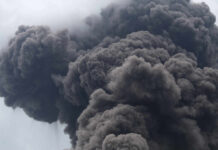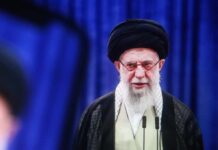
When you think about espionage, you picture thrilling spy movies, not real-life security forces intercepting foreign nationals stealing vital military intelligence—until now.
At a Glance
- Ukraine’s SBU detained a Chinese father and son for alleged espionage involving missile technology.
- The suspects targeted secret documentation on the Neptune missile system.
- If convicted, they face up to 15 years in prison.
- Ukraine used the Neptune to hit significant Russian military targets.
Espionage Attempt Thwarted
The Security Service of Ukraine (SBU) recently detained two Chinese nationals in Kyiv who were allegedly attempting to acquire and smuggle sensitive defense technology information on the RK-360MC Neptune missile system to China. This interception is a clear attempt to undermine Ukraine’s military capabilities by foreign actors, pointing to the global scramble to control advanced defense technologies.
Watch a report: Ukraine detains Chinese spies tasked with stealing Neptune missile technology
The detained individuals, believed to be a father-son duo, were set on their mission to subvert Ukrainian military technology. Suspicion quickly fell on the son, a former student in Kyiv, with the father reportedly orchestrating the espionage. The SBU’s rapid response not only prevented a significant breach but also highlighted the ongoing challenges Ukraine faces in protecting its strategic resources.
Ukraine has detained two Chinese nationals in Kyiv, suspected of attempting to steal classified Neptune missile technology for Chinese intelligence. This alleged espionage highlights ongoing foreign efforts to acquire vital military secrets.https://t.co/ZtvYzuJhL4
Ukraine…— Spotlight on China (@spotlightoncn) July 10, 2025
The Geopolitical Chessboard
This incident comes amidst strained Ukraine-China relations. Ukrainian authorities have pointed fingers at China for aiding Russia through channels of trade and technology transfers during the ongoing conflict. The worry is palpable, and this recent event only thickens the plot. It’s crucial to recognize the broader narrative where a “no limits” partnership between Moscow and Beijing stretches its tentacles across military, political, and economic cooperation.
The SBU “detained two citizens of the People’s Republic of China in Kyiv who were attempting to illegally export secret documentation on the Ukrainian RK-360MC Neptune missile system to China,” the agency said in a statement. insiderpaper.com
Ukraine has imposed sanctions against several Chinese entities accused of contributing to Russia’s drone capabilities, further illustrating an embattled relationship. Recent actions by President Zelensky reiterate the resolve to shield Ukraine’s sovereignty from deceptive foreign investments and attempts to infringe on its technological prowess.
Devana 🇺🇦 on X: “🚨 China caught spying on Ukraine’s missile tech
🚨 China caught spying on Ukraine’s missile tech
The Security Service of Ukraine (SBU) has detained two Chinese nationals in Kyiv who were attempting to steal classified technology related to the production of the Neptune missile system — the same missile that destroyed Russia’s… pic.twitter.com/AtTtTbqo1s
— Devana 🇺🇦 (@DevanaUkraine) July 9, 2025
Consequences and Broader Implications
The alleged espionage, if proven, means a possible 15-year sentence for the father-son pair. While the legal consequences are severe, the broader implications for international security dynamics are profound. Espionage cases often wind up unraveling networks and affiliations, posing questions about the lengths nations will go to in this fierce competition for military and technological supremacy.
The SBU said the former student was caught “red-handed” during the transfer of sensitive documents, and his father was detained shortly afterward.” kyivindependent.org
The Neptune missile system has proven its worth, notably when it destroyed Russia’s Black Sea Fleet flagship, Moskva. Ukraine’s use of Neptune in military operations against significant Russian assets cements the importance of protecting such military technology. In a world fraught with geopolitical tensions, Ukraine’s vigilance serves as a critical reminder of the persistent threats facing sovereign nations.

























